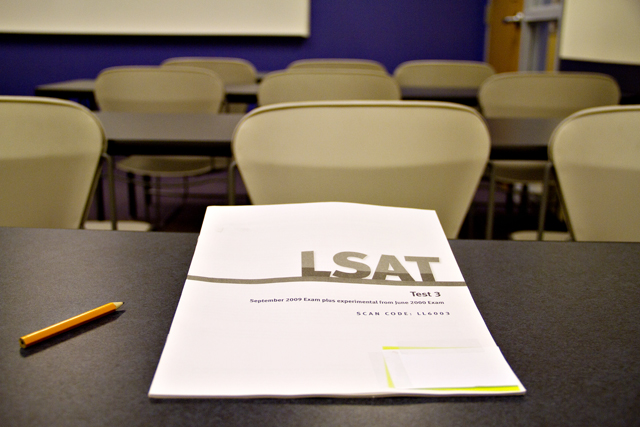
By Morgan Hays
Although it may seem like an event from the distant past to law students and law school graduates, the Law School Admissions Test (LSAT) is a present reality to hopeful law school applicants across the nation. That reality is changing, however—for applicants to State University of New York-Buffalo Law School and the University of Iowa College of Law.[1] Whether other schools will follow suit is uncertain, however the ABA is considering the idea as well. [2]
The LSAT was first developed in 1947 by law professors dissatisfied with current admission tests and considerations.[3] Previous to this, two other tests that had been developed by psychologists were widely used, both with the goal of evaluating the “educative promise” of undergraduate students.[4] In developing the 1947 LSAT, much of the goal was to somehow evaluate students’ propensity for success in the first year of law school.[5] While undergraduate GPA and class rank were also considerations in the law school admissions process at this time (as they are now), much weight was given to students’ LSAT scores.[6]
At SUNY Buffalo and Iowa College schools of law, that weight is being lifted. James Gardner, the dean at SUNY Buffalo law school, explained the factors working against the LSAT to Bloomberg Business. [7] Those factors range from affordability to already-in-debt students, to sheer inconvenience of the lengthy LSAT process.[8] As further motivation for the change, Gardner cites the fact that law schools have been experiencing record-low numbers of applicants in the last few years.[9]
The American Bar Association (ABA) is also reconsidering the weight to assign to LSAT scores, which was reflected in its decision to make a rule change in August 2014. [10] The rule change allows law schools to admit students who have not taken the LSAT to comprise 10 percent of the accepted students each year, so long as those students were at the top of their class as undergraduates.[11] In the past, the ABA has also given credit to the idea that law school admissions could be better off without the LSAT altogether.[12]
The ABA is also interested in the fact that ditching the LSAT, according to studies, “attracts more applicants and a more diverse applicant pool without leading to any loss in academic performance.”[13] Studies have also shown that the potential for high academic performance in law school is no lower in students that have been admitted who did not take the LSAT compared to admitted students who had taken the test. [14] Considerations of students’ scores on other standardized tests for admission to law school could also prove to be useful, according the LSAC.[15] Tests some law schools are already considering in lieu of the LSAT include the SAT, ACT, and GRE.[16] This is especially interesting as the SAT, a popular undergraduate admissions test, has recently undergone content and structure changes. [17] All of these factors taken into consideration suggest that there is definitely merit to the idea of leaving the LSAT in the past entirely — whether the LSAC will choose to do so remains to be seen.
[1] Natalie Kitroeff, The First Two Law Schools to Drop the LSAT Could Be Just the Beginning, http://www.bloomberg.com/news/articles/2015-02-24/the-first-two-law-schools-to-drop-the-lsat-could-be-just-the-beginning?hootPostID=0c78699b2a67b3c433683c93ec001856 (accessed Feb. 27, 2015).
[2] William P. LaPiana, Keynote Address, A History of the Law School Admission Council and the LSAT (N.Y., LSAC Annual Meeting May 28, 1998) (transcript available at http://www.lsac.org/docs/default-source/publications-(lsac-resources)/history-lsac-lsat.pdf).
[3] Id.
[4] Id.
[5] Id.
[6] Id.
[7] Natalie Kitroeff, The First Two Law Schools to Drop the LSAT Could Be Just the Beginning, http://www.bloomberg.com/news/articles/2015-02-24/the-first-two-law-schools-to-drop-the-lsat-could-be-just-the-beginning?hootPostID=0c78699b2a67b3c433683c93ec001856 (accessed Feb. 27, 2015).
[8] Id.
[9] Id.
[10] Id.
[11] Id.
[12] Scott Jaschick, ABA May Drop LSAT Requirement, https://www.insidehighered.com/news/2011/01/14/aba_may_end_requirement_that_law_schools_use_lsat (accessed Feb. 27, 2015).
[13] Id.
[14] Natalie Kitroeff, The First Two Law Schools to Drop the LSAT Could Be Just the Beginning, http://www.bloomberg.com/news/articles/2015-02-24/the-first-two-law-schools-to-drop-the-lsat-could-be-just-the-beginning?hootPostID=0c78699b2a67b3c433683c93ec001856 (accessed Feb. 27, 2015).
[15] Id.
[16] Id.
[17] Jamie Gumbrecht, Major Changes Coming to 2016 SAT Test: Here’s What, How, and Why, http://www.cnn.com/2014/03/05/living/sat-test-changes-schools/ (accessed Feb. 27, 2015).